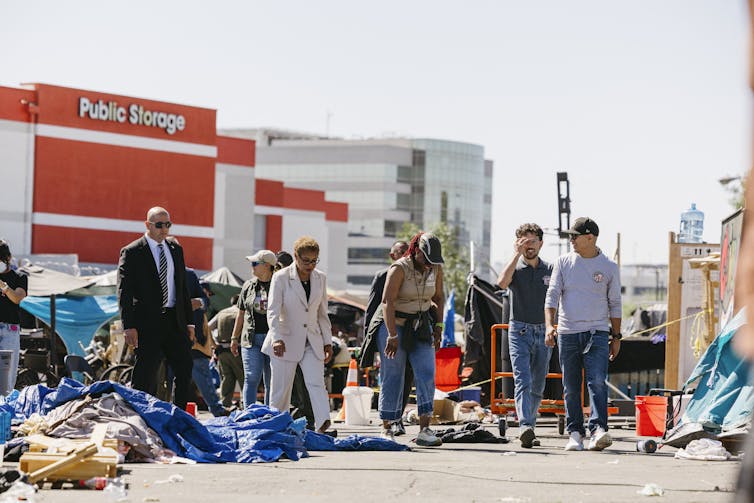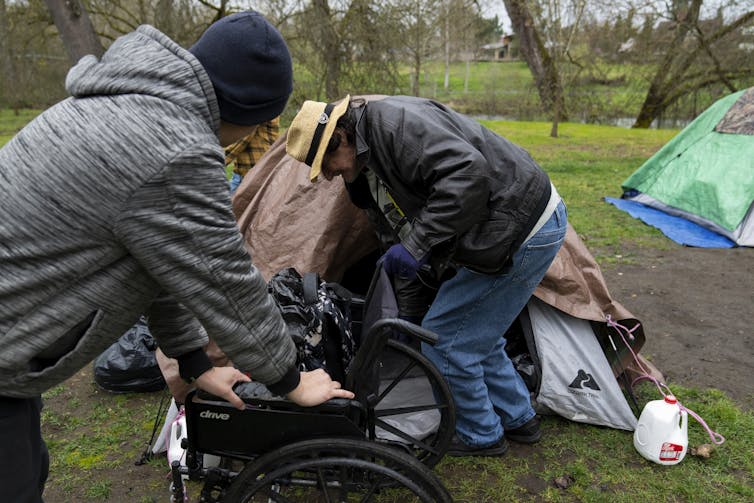San Francisco and other cities, following a Supreme Court ruling, are arresting more homeless people for living on the streets
- The Supreme Court’s June 2024 ruling (Grants Pass v. Johnson) allows cities to issue citations or arrest homeless people for sleeping or living in public spaces, even when there are no available shelter beds.
- Since the ruling, almost 220 local measures have passed that restrict or ban acts like sleeping, sitting, or panhandling in public, with California being one of the states with the highest rate of unsheltered homelessness.
- The enforcement of these bans has been shown to be ineffective in reducing homelessness and instead displaces people from one area to another, wastes public resources, and makes people living in camps sicker, leading to increased hospitalizations and deaths.
- San Francisco, for example, has seen a significant increase in arrests of homeless people, with over 1,000 people arrested in the past year, while Portland, Oregon, has taken a more nuanced approach, enforcing daytime camping bans but making only 11 arrests of homeless people for camping-related violations.

Homelessness is on the rise in the United States, and in some places, it is becoming more common for the police to arrest someone for sleeping or living in a public space.
In June 2024, the Supreme Court issued a ruling, Grants Pass v. Johnson, that determined it is constitutional to issue citations to or arrest homeless people, even when there is no available shelter.
The ruling reversed earlier federal appeals court rulings from 2019 and 2022 that determined cities cannot enforce anti-camping laws against homeless people if there are not enough shelter beds available for them.
The Supreme Court’s ruling also determined that the Eighth Amendment’s prohibition on cruel and unusual punishments does not protect homeless people from laws criminalizing resting in public places.
As someone who has spent more than a decade researching homelessness and speaking with unhoused communities, I have seen firsthand how enforcement of such laws imposes unavoidable hardships on homeless people and makes it harder for them to find a stable home.

David Pashaee/Middle East Images/AFP via Getty Images
A rise in punitive action against homelessness
In 2024, there were an estimated 771,480 people in the U.S. who experienced homelessness on a single night, the highest number ever recorded.
Since June 2024, almost 220 local measures have passed that restrict or ban acts like sleeping, sitting or panhandling in public in cities that include Phoenix; Gainesville, Florida, and Reno, Nevada.
The rate of unsheltered homelessness, meaning homeless people who are sleeping in places that are not meant for humans to rest in, like parks or cars, is the highest in California.
After the Supreme Court’s decision, California Gov. Gavin Newsom issued an executive order in July 2024 that directs state agencies and departments to adopt new policies that remove homeless encampments. Those are temporary outdoor living spaces used by homeless people, often on public or private property.
Following this executive order, more than two dozen California cities and towns adopted or considered adopting sweeping bans on homeless encampments.
Not every leader has embraced this approach of what some observers call criminalizing homelessness. Los Angeles Mayor Karen Bass, for example, rejected criminalizing homelessness as “backwards” in June 2024.
Nevertheless, many cities are enforcing existing and new bans on homeless encampments more aggressively than before the Supreme Court decision – despite evidence that such enforcement is not effective in dealing with the problem of homelessness.
The impacts of aggressive enforcement
Research shows that arresting someone without a home for sitting, resting or sleeping in a public place does not reduce homelessness.
Instead, encampment sweeps and camping bans typically displace people from one area to another, while discarding or destroying their personal belongings in the process, such as identification cards, medications and sleeping gear.
This approach also wastes public resources by paying groups to throw away people’s belongings instead of investing that money into actual housing solutions, like creating more affordable housing options.
Homeless encampment sweeps by police or other government officials are also shown to make people living in camps sicker, leading to increases in hospitalizations and even deaths among those dependent on drugs or alcohol.
A punitive shift in San Francisco
San Francisco is an example of an American city with a relatively large homeless population that has taken a more aggressive approach to enforcing bans on homeless encampments over the past year.
A few weeks after the Supreme Court decision, then-San Francisco Mayor London Breed promised to be “very aggressive” in removing homeless encampments. She also said that “building more housing” would not solve the homelessness crisis.
City data shows that in the 12 months since the Supreme Court ruling, San Francisco police had arrested more than 1,000 homeless people for living in a public space – a scale of enforcement rarely seen in the city’s past. In the year leading up to the ruling, 111 people were arrested for illegal lodging
San Francisco identified approximately 8,300 homeless city residents in 2024.
In June 2025, I conducted a survey of 150 homeless people in San Francisco. About 10% of those people who gave a reason for a recent arrest reported being jailed for lodging without permission. Another 6% said they were arrested for trespassing.
In the same survey, which is part of an ongoing project, 54% of homeless San Francisco residents reported being forced to move from a public space at least once.
Another 8% reported being cited for another reason related to trespassing.
A less aggressive path in Portland
Other western American cities with large homeless populations have taken slightly different approaches to removing homelessness encampments since June 2024.
Portland, Oregon, for example, began enforcing a new daytime camping ban in July 2024. But Portland police have only made 11 arrests of homeless people for camping-related violations over the past year.
Other homeless people in Portland have received police citations for other offenses, like trespassing.
As part of my June 2025 study, I surveyed 150 homeless Portland residents. About 49% of respondents reported having been arrested at some point in their lives. Though no respondents were arrested for camping in a prohibited place, 68% of people I spoke with reported that police or other government officers forced them to leave a public space at some point over the past year.
And 13% of those who gave a reason for being cited by police said it was for camping in a prohibited place. Another 11% of homeless people were cited for some other reason related to living without shelter.
As part of the study, I also interviewed residents who had been arrested while living on the street. One Portland resident I interviewed – who asked not to be named to preserve their anonymity – told me they lost the chance to rent an apartment because they were arrested in 2023 on a preexisting, unrelated warrant after a police officer checked their ID – just days before they were supposed to pick up their keys.
“Many unhoused people have warrants simply for failing to appear after being cited for sitting or resting in public space,” they said. “I was supposed to go get the keys and, bam, I got picked up. I was arrested and went to court. Just me being in jail for five, six or five days screwed it all. I didn’t show up to get the keys, and then (the landlord) couldn’t get ahold of me, and they had no idea what was going on.”
The weeklong jail stay not only pushed this person back onto the street, but it also put them back onto a waiting list for housing – where they remain in 2025.

AP Photo/Jenny Kane
Looking ahead
The Supreme Court’s 2024 ruling did not mandate that cities criminalize homelessness. But it effectively gave cities the green light to do so without fear of violating people’s constitutional protections.
The effects of this ruling will be further felt with President Donald Trump’s July 24, 2025, executive order that ended federal support for approaches like Housing First, a policy that prioritizes providing homeless people with housing, before any other needed help. The order also calls for involuntarily committing homeless people with mental illness to mental health institutions.
As more cities consider tougher encampment ordinances, I think it is worth considering if more punitive measures really address homelessness. Decades of evidence suggest they won’t.
Instead, arresting homeless people often deepens their poverty, increases displacement and diverts public funding away from the real solution – stable, affordable housing.
![]()
Stephen Przybylinski does not work for, consult, own shares in or receive funding from any company or organization that would benefit from this article, and has disclosed no relevant affiliations beyond their academic appointment.
